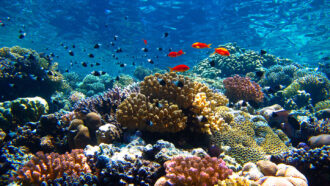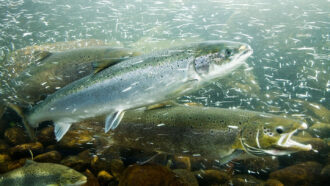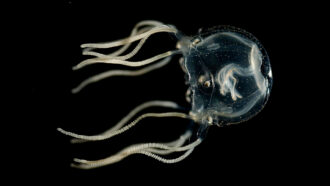Life
-
 Oceans
OceansShading corals during midday heat can limit bleaching
Shading coral reefs during the sunniest part of the day may help corals survive marine heat waves.
-
 Animals
AnimalsScientists Say: Camouflage
Plants and animals alike hide in plain sight using this sneaky strategy.
-
 Environment
EnvironmentPumping cold water into rivers could help fish chill out
Hundreds of salmon, trout and other fish sought shelter from summer heat in the human-made cool zones. These areas may help fish adapt to river warming.
By Nikk Ogasa -
 Animals
AnimalsThese jellyfish can learn without brains
No brain? No problem for Caribbean box jellyfish. Their simple nervous systems can still learn, a study suggests.
-
 Tech
TechBits of trees can make and store energy for us to use
This cellulose and lignin, two major building blocks of trees, could lead to greener electronics.
-
 Tech
TechBionic plants and electric algae may usher in a greener future
Some can aid the climate by removing pollutants. Others would just avoid dirtying the environment in the first place.
-
 Climate
ClimateSome tree leaves are finding it too hot for photosynthesis
Earth’s ongoing fever threatens to push entire forests toward this heat limit — and possible death.
By Nikk Ogasa -
 Plants
PlantsYoung corn leaves can ‘smell’ danger
As they mature, these leaves lose their ability to detect threatening scents.
-
 Plants
PlantsScientists Say: Fertilize
This word describes both a stage of sexual reproduction and the agricultural practice of adding nutrients to soil.
-
 Animals
AnimalsLet’s learn about why turkeys are dinosaurs
Modern birds are the only dinosaurs that survived an apocalyptic extinction event 66 million years ago.
-
 Brain
BrainScientists Say: Deep brain stimulation
Through wires implanted in a person’s brain, this medical treatment can help treat various conditions.
-
 Animals
AnimalsInvertebrates are pretty clever, but are they conscious?
Scientists are designing experiments to test whether these animals have self-aware experiences as we do.